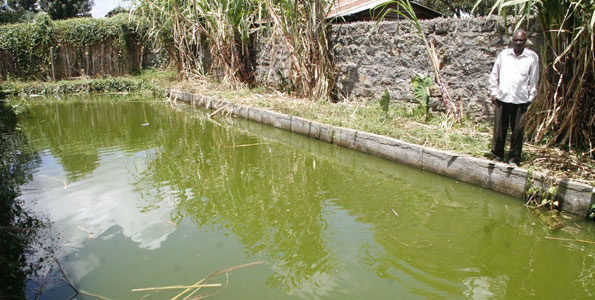Thinking outside the box and patience have worked for Njoro fish farmer Peter Njuguna. He first ventured into fish farming after 12 long years of savings, reviews, and endless education. “I do not have acres but a three-quarter piece of land and I had to think long-term to make good money. That required making informed calculations,” says Mr Njuguna.
He sold plastic shoes for five years, earning a nickname of ‘Chunga Mguu,’ which means “take care of your feet.” By the time he started commercial fish farming, he had more than Sh300,000 in his piggy bank.
Another hurdle was access to a reliable source of water. He comes from a dry region but water is part and parcel of aquaculture. He turned to water harvesting after he bought containers whose total capacity is 50,500 litres.
“This is one area where water is a major problem. And, therefore, for a farmer who wants to start a fish pond, it is a hurdle that he must overcome,” says Mr Njuguna.
“I constructed an 80 by 26 feet fish pond, five feet deep, and acquired two septic tanks and constructed an underground one which enabled me to store enough rain water. Then I bought fingerlings. All these cost me Sh300,000.”
He started with 1,000 golden fish fingerlings which he approximates have multiplied to more than 40,000 in the 12 years of the business.
Cost of feeds, he says, is the other challenge that has been giving the farmer sleepless nights, explaining it would be a tough climb for small players to break even. “If you want to construct my size of the fish pond, you must be thinking of using about more than Sh1 million because the cost of construction materials is high,” he says.
However, Mr Njuguna has found an uncommon way to lower the feeding costs. He feeds the fish with bread and mandazi with scoops of the manufactured fish pellets.
“A 50kg of the fish pellets currently goes for Sh1,500 which till recently was sold at around Sh900 and this can last for two weeks. This translates to Sh3,000,” he says. Aquaculture is steadily gaining ground in Kenya after the Government marked it as one of the economic stimulus programme projects.
The hyacinth menace in Lake Victoria has meant that even people from the lake region venture into fish farming as opposed to fishing. Last year, the fish output rose by 5.1 per cent to 161.8 thousand metric tonnes, mainly due to “more catches from Lake Victoria and fish farming,” says the Economic Survey 2014.
Every three months Mr Njuguna harvests a maximum of 500 fish, selling each at Sh150. Last year he made Sh300,000, which he pumped into his property investments.
Fish farming requires high level of cleanliness, so Mr Njuguna keeps intruders at bay, constantly harvests water and ensures algae are afloat for oxygen circulation as well as supplement food droppings.
There is a huge fish market, he says, but adds that “consumers require a ready supplier channel so that they do not get spoilt as fish is a highly perishable commodity that requires refrigeration.”
Common courtesy and dependability are some of the qualities that has seen him get loyal customers, who speak well about him and collect the fish from his farm. “I started with fish traders who spread the word about me to others and before long I got an order from one of the supermarkets in Nakuru town, which I did not expect,” he says. “Slowly I became popular and received more orders.”
What matters most, he says, is how you deal with the customers. “Are you honest? Can they trust you with their deposit? If you are the kind that short-changes them just because you have a high demand, they will go and never return.”
He supplies schools, universities, colleges, supermarkets, wholesale fish traders, and individuals. “Usually I harvest on prior orders. I cannot remember when I ever harvested and they got spoilt because they were not bought,” he says.
Apart from fish, he grows strawberry, cassava, cabbages, and kales and keeps indigenous poultry. It is this mixed farming that has earned him the prestige of being a trainer.
Weekly, he receives farmers from across Kenya, Uganda and Tanzania, who want to break into commercial farming. He charges every farmer Sh200 for tips.










